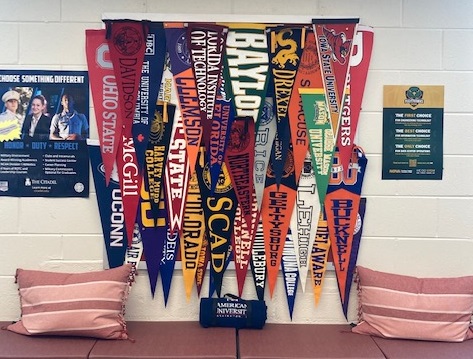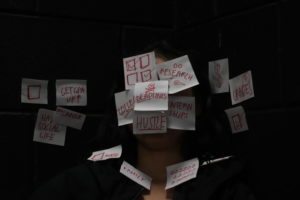Beyond the resume

Jefferson’s College and Career Center is a great place for students navigating the college application process. From researching schools to polishing their resumes, students can find a wealth of resources here, helping them make informed decisions about their future. With support from the College and Career Center, we can take the next steps on our educational journey with confidence.
May 19, 2023
Picture this: a group of seniors huddled over their laptops, frantically filling out college applications. As they craft their essays and list their achievements, one question lingers in the back of their minds: how much of their real selves should they reveal? In a society where perfection is praised and vulnerability is often stigmatized, the college application process can feel like a high-stakes balancing act between presenting an idealized image and being honest about one’s flaws and struggles, as counselor Sharmane Delgado-Payne explains.
“When my son was applying to college, I realized some of the applications were full of crap. You can look good on academic papers, but are you good? How’s your heart, how’s your mind,” Payne said.
As a student at Jefferson with a sibling in their senior year, I witnessed the pressure my sister and friends felt to showcase their achievements on their college applications. But I also saw a side of them that was rarely mentioned in their impressive lists of accomplishments: their struggles with mental health. It made me wonder: how much of our true selves are we really revealing on our college applications?
“It’s not completely intentional to exaggerate yourself or not show the full picture, but it’s the human experience. Who wants to say ‘I’m a terrible person and I struggle with certain things’? Part of us that wants to be good, and wants to be accepted by others. Whether that’s good, bad, or indifferent depends on to what degree. But I do believe that it’s natural or inherent,” Payne said.
College applications are an incredibly important step in a student’s life, as they mark the transition from high school to college. However, the process can be daunting, as it requires students to not only showcase their academic prowess but also to reveal their personal selves. With thousands of students vying for a limited number of spots, it’s natural to want to put your best foot forward. This often means highlighting your achievements, polishing your essays, and presenting yourself in the best possible light. But in doing so, are students sacrificing their authenticity? Senior Malayeka Khan believes so.
“People don’t reveal themselves fully. Everyone has their perception of self and they kind of see things how they see it. People can have a different view of themselves, and it’s blended with parts that you see and sometimes can be blended with the truth. You always wanna look like the better person,” Khan said.
But what happens when students prioritize their image over their authenticity? What are the consequences of hiding their true selves in the pursuit of acceptance? In this competitive world, it can be tempting to present a polished, flawless version of oneself. However, the costs of this approach may be greater than students realize.
“There are absolutely consequences of not revealing our true selves and identity on college apps. Society tells us that people have different perceptions of us if we don’t have Harvard, Princeton, etc on our transcript, so we do whatever it takes to get there. But does that mean you’re not a quality student? Does that mean anything really? Because as a hiring manager, as someone that has worked in corporate America, I’m not looking at where you went to school. What I’m looking at is quality. Do you fit? Fit is really important,” Payne said.
Choosing a college is a significant decision, and that comes with many considerations. While it’s natural to want to present yourself in the best possible light, it’s important to be mindful of external pressure, such as parental expectations, that can cloud our judgment away from what we truly want.
“I know for a lot of people there is that parental pressure. They say ‘we have to be the best and this is what the best looks like’, but the best could be a school in the state, or even outside the country. It’s what we feel like the best is for us,” Khan said.
Applicants should consider what they truly want in a college, not just what others expect of them.
“When I look at a student that I’ve worked with, I tell them you have to work through the family pressure. You have to think if you’re going to this school because of tradition or is this something you want to do for yourself. Because at the end of the day, you have to be happy with your journey. Not what someone else wants for you,” Payne said.
Colleges aren’t just looking for students with impressive resumes; they’re also looking for individuals who will be a good fit for their institution. And the only way to truly determine that is by getting to know the real person behind the application, and the reason they’re choosing this school.
“Your grades and accomplishments may get you in the door, but it’s your character and personality that will keep you there,” Khan said.
That being said, it’s important to note that revealing your true self doesn’t mean airing all your dirty laundry. There’s a fine line between being authentic and oversharing. While it’s okay to talk about your struggles and setbacks, it’s important to do so in a way that shows growth and resilience. Likewise, it’s important to present yourself in a positive light, but not at the expense of being true to who you are. Broaden your perspective and consider what it truly means.
“Consider yourself in another country. Another female, just wants to go to school. They’re not looking at Harvard. They’re looking to see if they can get their base education. So if you broaden your perspective, it will take the pressure off of you as a student and as a person. The affirmation comes from the inside,” Payne said.

So, how can students strike a balance between presenting their best selves while also being authentic? One way is by focusing on their passions and interests. By highlighting the things that truly excite them, students can convey their genuine enthusiasm and personality. Additionally, students should take the time to reflect on their experiences and how they’ve shaped them as a person. By showing vulnerability and self-awareness, students can reveal their true selves while also demonstrating their capacity for growth.
“Getting your education is probably the most important thing you’ll do as a person. Think about your journey because in five years that’s gonna matter. In a year that’s gonna matter. I’m one to not put pressure on because I went through that with my son. I let him lead. He didn’t go to the college I wanted, but that’s what he needed and he did it,” Payne said.
At the end of the day, college admissions officers are looking for real human beings with diverse backgrounds, unique experiences, perspectives and aspirations-not just cookie-cutter versions of the same idealized applicant who fits a predetermined mold. So don’t be afraid to let your real self shine through—you never know, your individuality that makes you stand out may be the very thing that sets you apart and lands you a spot at your dream school.
“No matter what happens, tell yourself that you’re a rockstar. You are all of that, you’re whole, and the logo does not make you whole. You have the capability, the skill. But still, be proud. Be proud of Jefferson and whatever other schools you chose, and that you’re associated with them. Be proud because you did that. But don’t make it a qualifier of who you are as a person,” Payne said.









